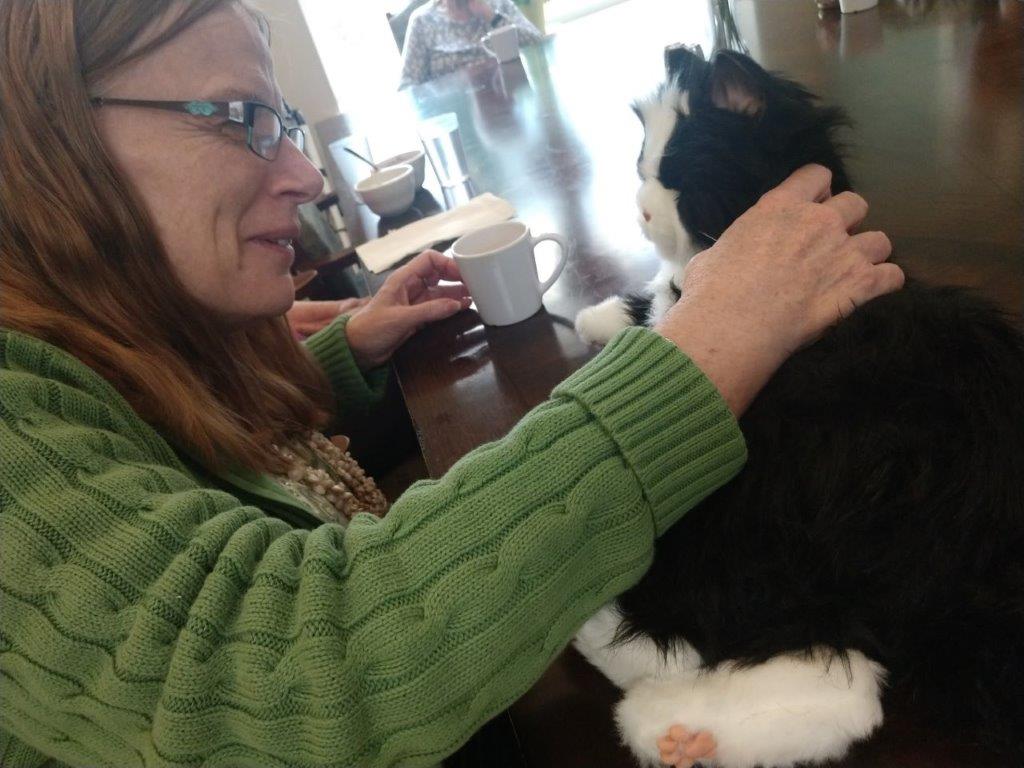Tuesday, April 27, 2021

Dolores Gillet, a resident of a care facility served by the Area Agency on Aging of North Idaho, smiles as she holds a robotic cat in her lap. The agency provided the interactive toy pets to care facility residents while they were isolated during the pandemic, and the cat were a big hit in helping lift the residents’ spirits.
Before COVID-19 vaccines became available, during months and months of isolation from their friends and family members, some North Idaho residents received comfort from an unlikely source.
Robotic cats became the purr-fect pandemic pals for people living in care facilities served by the North Idaho Area Agency on Aging.
The agency began providing mechanical felines to care facility residents during the pandemic after Roseanna Lewis, an associate ombudsman, heard from an out-of-state friend that a robotic cat was helping her aging mother who was experiencing depression.
“Her mom really perked up,” Lewis said. “It was a real gamechanger for her.”
The results were the same in North Idaho.
Lewis described the reaction of one resident – a woman in her 90s who typically sat in her wheelchair, looking at the ground. When one of the cats was placed in the woman’s lap, her head lifted and she began to smile.
“She petted that cat nonstop,” Lewis said. “She was even concerned about what they were feeding it. The care facility said they hadn’t seen her so happy.”
With motion and touch sensors, the furry robots respond to their handlers like real kitties. They breathe, purr, blink their eyes, roll on their backs and lick their paws.
“The results were just tremendous,” Lewis said. “It’s such a big thing to the people who are living in these facilities. They feel a real connection to pets, especially if they’ve had a cat that they’ve had to give up.”
The robotic cats’ therapeutic value was demonstrated last year when the interactive toy pets were the focus of research completed by Bryanna Streit, then a doctoral program student at Florida Atlantic University’s Christine E. Lynn College of Nursing. A dozen older adults with Alzheimer’s disease and related dementias were assessed after being given robotic cats as an alternative to traditional pet therapy. A series of tests completed over the course of 12 visits showed the participants’ moods, behaviors and cognitive function improved significantly after they began interacting with the mechanical cats.

“The robotic pets provided a means of engagement and entertainment and also evoked participants to share memories of their previous pets. As a group activity, it also offered opportunities for the participants to communicate with each other,” said Lisa Kirk Wiese, Ph.D., R.N., an assistant professor and Streit’s faculty chair at FAU, in an article published on the university’s website. “Using interactive pets was beneficial to our adult day center attendees as evidenced by the increase in their test scores.”
Lewis, who delivered the robotic cats to various care facilities served by the Area Agency on Aging throughout Idaho’s five northern counties, said the experience was “absolutely uplifting.”
“It’s one of those heartwarming moments,” Lewis said. “When you see how this one little thing has made such a tremendous difference.”
By Maureen Dolan, the Community Relations Coordinator for North Idaho College
NIC is the sponsoring agency for the Area Agency on Aging of North Idaho. The college is contracted by the Idaho Commission on Aging to deliver core services for the region’s elderly.